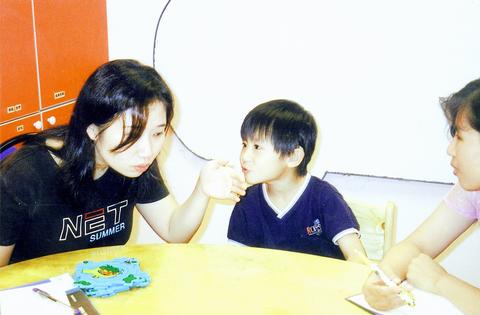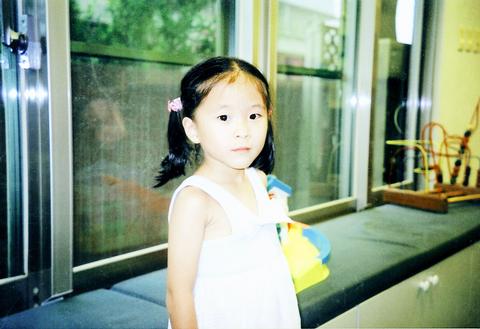When Ho Hsin-yu (
As a toddler, Hsin-yu seemed to be as curious and active as other toddlers. She began to speak at a normal age, but her parents slowly discovered speech problems. When speech therapy failed, the speech therapist presented her parents with the possibility that she was deaf. After tests, it was confirmed that Hsin-yu was severely deaf. Her parents were confused because the cause of her deafness was unknown. They were also worried about the limitations it presented to Hsin-yu's future.
Hsin-yu's parents were informed that she still had a chance of learning to hear and speak, and were introduced to auditory-verbal therapists at the Children's Hearing Foundation. Now almost five years old, Hsin-yu can hear with the help of a hearing aid and can speak as fluently as other children her age. Since April this year, Hsin-yu has been attending regular kindergarten. She has become more outgoing, and loves playing with her classmates. Her mother said that classmates were accepting of her, and that Hsin-yu has no problem keeping up in class. She will be able to attend an elementary school with non-deaf children when she is older. Being able to interact with other children is an opportunity few deaf children are given.

PHOTO: DIANE CHANG, TAIPEI TIMES
A new departure
The Children's Hearing Foundation was founded by Joanna Nichols and her husband Kenny Cheng in 1996 to teach Taiwan's hearing impaired children to speak and hear through auditory-verbal (AV) therapy. A learning center was established, with a team of audiologists and auditory-verbal therapists who provide regular checkups and weekly sessions without payment. A second center was built in Kaohsiung last year. Besides giving lessons and providing checkups, the foundation also holds periodical seminars and discussion sessions for parents to discuss issues and share experiences.
The founder of the Children's Hearing Foundation, Joanna Nichols, was a California native who moved to Taiwan in 1977 and married a Taiwanese man, Kenny Cheng. After their profoundly deaf daughter learned to hear and speak with the help of a Canadian auditory-verbal therapist, Nichols decided to give other hearing impaired children the same opportunity, by introducing the Canadian methods to Taiwan. Hoping that the foundation would one day help deaf children throughout Asia, Nichols and her husband invested a great deal of time and money. But after Nichols learned that cancer was to take her life, students have had to pay a basic fee of NT$700 for each one-hour session since March this year. The foundation continues to provide financial aid for families who cannot afford the fee.

PHOTO: DIANE CHANG, TAIPEI TIMES
The Children's Hearing Foundation is the first organization in Taiwan to focus exclusively on teaching deaf children to hear and speak. Because schools for the deaf in Taiwan generally accommodate students with multiple disabilities and profound or complete deafness, AV therapy cannot be used effectively. These students are taught through other methods and given job training, but they do not acquire the full range of abilities non-deaf students have. Using auditory-verbal therapy, the foundation helps deaf children overcome the disability that limits their capabilities and actions.
Most children are able to return to regular schools after some years of AV therapy. "A child who is taught using AV therapy is able to communicate verbally, so his education, profession and marriage will not be different from ours. Because the child is not isolated from society along with other deaf people, he has a chance to become more accomplished," said Wu Hsu-feng (吳淑芳), chief therapist at the foundation.
Building on potential
Since 95 percent of hearing-impaired persons have some potential hearing ability, some hearing can be restored if a hearing aid is used and this remaining ability is exercised through auditory-verbal therapy. By constantly repeating simple sounds to children, auditory-verbal therapists stimulate the auditory nerves and help develop a sensitivity to sound.
Because this stimulation has to be constant, parents play a large role in the process, and are required to attend sessions with the child. In comfortable and colorful classrooms, therapists use toys and other props to help children make a connection between the sounds they hear and common objects. Therapists and parents cover their mouths when speaking to prevent children from lip-reading. When a child starts to repeat sounds, therapists help them refine pronunciation. Themed classrooms, set up like a bedrooms, a living room and a fully equipped kitchen can help children practice speaking and listening in realistic situations.
Auditory-verbal therapy is most effective with young children and infants because the crucial period in language development occurs before the age of six. By the time a deaf child reaches its teens, they have often developed a reliance on other senses, and do not depend on sign language or lip-reading to communicate. The foundation currently has students up to the age of 14.
With more than 150 students and 20 teachers in Taipei alone, the Children's Hearing Foundation continues to train teachers and aims to reach out to deaf children throughout Taiwan. With centers soon to open in Ilan and Taichung, the foundation is searching for alternate sources of funding. With persistence and a lot of patience, the staff at the Children's Hearing Foundation continue to work toward goals like making hearing tests available for newborns in more hospitals and collaborating with different city and county governments. Wu also said that in the long term, "we hope the foundation will become a resource center for deaf children throughout Asia."

Growing up in a rural, religious community in western Canada, Kyle McCarthy loved hockey, but once he came out at 19, he quit, convinced being openly gay and an active player was untenable. So the 32-year-old says he is “very surprised” by the runaway success of Heated Rivalry, a Canadian-made series about the romance between two closeted gay players in a sport that has historically made gay men feel unwelcome. Ben Baby, the 43-year-old commissioner of the Toronto Gay Hockey Association (TGHA), calls the success of the show — which has catapulted its young lead actors to stardom -- “shocking,” and says

The 2018 nine-in-one local elections were a wild ride that no one saw coming. Entering that year, the Chinese Nationalist Party (KMT) was demoralized and in disarray — and fearing an existential crisis. By the end of the year, the party was riding high and swept most of the country in a landslide, including toppling the Democratic Progressive Party (DPP) in their Kaohsiung stronghold. Could something like that happen again on the DPP side in this year’s nine-in-one elections? The short answer is not exactly; the conditions were very specific. However, it does illustrate how swiftly every assumption early in an

Inside an ordinary-looking townhouse on a narrow road in central Kaohsiung, Tsai A-li (蔡阿李) raised her three children alone for 15 years. As far as the children knew, their father was away working in the US. They were kept in the dark for as long as possible by their mother, for the truth was perhaps too sad and unjust for their young minds to bear. The family home of White Terror victim Ko Chi-hua (柯旗化) is now open to the public. Admission is free and it is just a short walk from the Kaohsiung train station. Walk two blocks south along Jhongshan

Francis William White, an Englishman who late in the 1860s served as Commissioner of the Imperial Customs Service in Tainan, published the tale of a jaunt he took one winter in 1868: A visit to the interior of south Formosa (1870). White’s journey took him into the mountains, where he mused on the difficult terrain and the ease with which his little group could be ambushed in the crags and dense vegetation. At one point he stays at the house of a local near a stream on the border of indigenous territory: “Their matchlocks, which were kept in excellent order,